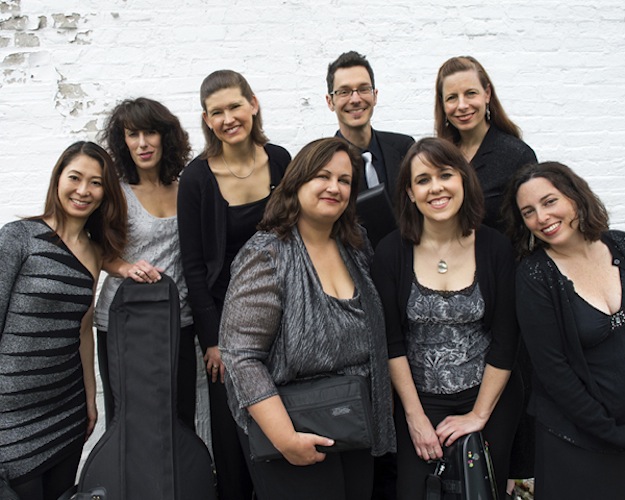Fuse Concert Review: Radius Ensemble’s “Insight” — As Probing As Ever
Radius Ensemble’s final performance of the season touched on examples of musical fantasy, worldly angst, and spiritual transcendence.

Radius Ensemble — (L to R): Noriko Futagami Herndon, viola; Miriam Bolkosky, cello; Anne Howarth, horn; Jennifer Montbach, oboe, Artistic Director; Eran Egozy, clarinet; Gabriela Diaz, violin; Sarah Brady, flute; Sarah Bob, piano. Not pictured: Adrian Morejon, bassoon. Photo: Liz Linder.
By Jonathan Blumhofer
Radius Ensemble wrapped up its 16th season at the Longy School’s Pickman Hall of Saturday night with a typically eclectic, wide-ranging program. If the concert, which touched on examples of musical fantasy, worldly angst, and spiritual transcendence, didn’t quite exceed the sum of its many parts, one could hardly fault Radius their ambition or vision, which seems as engaged and probing as ever.
I certainly welcomed the opportunity to hear a new piece by Gabriela Lena Frank, a youngish composer who’s been tapped by the Handel and Haydn Society for a bicentennial commission due next month. Her Four Pre-Inca Sketches, heard on Saturday, draws on her Peruvian ancestry and featured some striking moments. Scored for flute and cello, the piece takes its inspiration from four relics that predate Incan civilization Frank encountered in a museum. There are references to Peruvian flute and panpipe performance styles, as well as some imaginative aural recreations of visual images seen in the ancient artworks (especially the tumbling motives in the second movement, “Bird-Man of Parácas”).
But the whole piece didn’t quite add up and none of it stuck in my mind as strongly as did the last movement, “Broken Panpipe from Nazca.” It contained, to these ears, the most interesting materials as well as demonstrated the best fusion of a dramatic concept with music. Loosely depicting a ceremony in which panpipes were destroyed, the piece begins with the cello glissandoing in fourths while the flautist blows air through the instrument. The two players increasingly interact as the movement proceeds only for the flute’s final breath of air to be suddenly broken off.
Reservations about the piece aside, Radius’s performance of it was strong. Sarah Brady dispatched a fluid, colorful account of Frank’s sometimes highly acrobatic flute writing while Miriam Bolkosky delivered a solid performance of the somewhat subordinate cello part.
Robert Schumann’s Märchenerzählungen (Fairy Tales) followed the Frank and at least possessed the charm of a distinctive orchestration: there aren’t too many trios for clarinet, viola, and piano (Mozart’s Kegelstadt Trio is the only such piece one might seriously argue lives anywhere near the fringes of the repertoire). That said, Märchenerzählungen is a stern, rather dour late score of Schumann’s, redeemed mainly by its beautifully flowing third movement.
On Saturday, that movement came off best, singing sweetly in the hands of clarinetist Eran Egozy, violist Noriko Futagami Herndon, and pianist Sarah Bob. The other three, which are more march-like in character, were dogged by some spotty intonation and rhythmic stiffness. None of them really took off, though my sense is that this probably had more to do with Schumann’s rather subdued writing in the piece than with flaws in the performance.
The concert’s second half brought more substantially satisfying fare, beginning with Sofia Gubaidulina’s 1989 String Trio. As I noted in a CD review earlier this year, the string trio seemed to occupy a special place for many 20th-century Eastern European composers. Gubaidulina’s no exception, and this Trio is an especially powerful, nihilistic entry into the genre.
It has three movements. The first begins with all three instruments playing in unison. Gradually they head in separate directions, though aleatoric gestures unify, to a degree, their independent paths. In the second movement, the violin and cello work as a unit exchanging pizzicato phrases while the viola intersperses bowed melodic fragments. The finale maintains the bleak aura of the earlier movements, ending with a desolate thud.
On Saturday, violinist Gabriela Diaz joined violist Herndon and cellist Bolkosky in a taut, vigorous realization of Gubaidulina’s austere score. Explosive moments in the outer movements might have been a bit wilder, but the music’s punching gestures and unrelenting affect came across with dire urgency.
For a kind of spiritual catharsis, Radius closed Saturday’s concert with Arvo Pärt’s Fratres. This 1977 score exists in arrangements for all sorts of instrumental groupings; Saturday night featured Beat Briner’s setting of the piece for eight wind instruments plus percussionist.
The idea behind Fratres is simple: “minimal notes…beautifully played,” to borrow from Katherine Allwine Bacasmot’s program note. Saturday’s performance was warm and sincere. It wasn’t perfectly clean – there was some questionable intonation and spots of shrillness – but, coming in the immediate context of the Gubaidulina Trio, this Fratres made a refreshing palate cleanser. And, if you wanted to think of it as a capstone to one of this spring’s first truly seasonal days or as a wrap-up to the most hectic months of the concert calendar, well, you could: Fratres fit those bills (and, presumably, several others) nicely, too.
Jonathan Blumhofer is a composer and violist who has been active in the greater Boston area since 2004. His music has received numerous awards and been performed by various ensembles, including the American Composers Orchestra, Kiev Philharmonic, Camerata Chicago, Xanthos Ensemble, and Juventas New Music Group. Since receiving his doctorate from Boston University in 2010, Jon has taught at Clark University, Worcester Polytechnic Institute, and online for the University of Phoenix, in addition to writing music criticism for the Worcester Telegram & Gazette.
